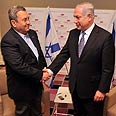
Netanyahu, Barak strike coalition deal
Ahead of Labor's Central Committee meeting on joining Likud-led government, parties' leaders meet to try and bridge differences. Prime minister-designate says will be committed to all peace deals signed by Israeli governments, vows Labor chairman will be involved in all significant diplomatic and economic processes
The Labor Party's Central Committee will convene at Tel Aviv's Exhibition Grounds on Tuesday afternoon to discuss the matter. Chairman Ehud Barak met early Tuesday with Likud leader and Prime Minister-designate Benjamin Netanyahu and signed a coalition agreement which would be presented to the convention.
The two party leaders arrived at the Kfar Maccabiah Hotel in Ramat Gan in an attempt to bridge the differences and finalize the remaining issues in the coalition negotiations, mainly on the economic level.
At around 9 am, the sides reported of significant progress in the talks. The issues agreed upon and slated to appear in the coalition agreement between the two parties include the following:
- Israel will work to reach a comprehensive regional agreement for peace and cooperation in the Middle East.
- Israel is committed to all diplomatic and international agreements signed by the Israeli governments.
- The government will work to obtain peace agreements with each of its neighbors.
- The defense minister (Barak) will be a full partner in the diplomatic process and will be a partner in any limited forum aimed at making decisions in the diplomatic, security and economic field.
- The government will work to enforce the law in terms of the illegal outposts, as well as illegal Palestinian construction.
In his agreement to "all diplomatic deals" Netanyahu is essentially ratifying his old commitment to former US President George W. Bush's Road Map, which was adopted at the time by the Ariel Sharon government, alongside its reservations.
The map included the two-state for two people solution. In his coalition talks with Kadima Chairwoman Tzipi Livni, the prime minister-designate had refused to commit to the establishment of a Palestinian state.
As for the economic issue, the sides agreed not to make significant decisions without bringing them to the approval of a "round table forum" comprised by representatives of the Treasury, the Histadrut labor federation, the Manufacturers Association of Israel and the social organizations.
"We have reached unprecedented achievements," said Histadrut Chairman Ofer Eini, a member of Labor's negotiation team. According to the agreement, the party will receive five ministers and two deputy ministers, as well as the chairmanship of a Knesset committee.
Agriculture Minister Shalom Simhon said, "This agreement talks about a significant diplomatic process, as well as maintaining the rule of law in Israel. This is a dramatic agreement. I have sat in three governments and have not seen such a great achievement. Anyone who views themselves as part of a social-democratic party will find it difficult to support it."
The negotiations between Labor and the Likud were only launched on Monday, with Barak instructing his team to strike a deal quickly and bring it to the Central Committee's approval.
The team declared Monday that "there are fundamental difficulties and differences," and Likud officials said that the Labor representatives asked to re-discuss clauses included in the coalition deals signed with the Yisrael Beiteinu and Shas parties.
The Knesset members opposing Barak expressed their anger over the early negotiations, which are being held before being green-lighted by the party's institutions.
In a letter sent to Netanyahu on Monday, the MKs referred to Labor's negotiating team as the "Barak faction" and clarified that they would not be committed to the understandings reached in the talks.
'Using Lieberman's methods'
Another clause which is making the opposing MKs' blood boil is Barak's plan to get the Central Committee's approval to appoint all of the party's ministers himself, as part of the decision to join the government.
"He is a dictator, using (Yisrael Beiteinu Chairman Avigdor) Lieberman's methods," one of the chairman's rivals stated Monday.
The two clauses will be voted on at the Central Committee, and the race appears to be close.
This is the resolution the 1,476 committee members will be voting on: "The party's Central Committee approves the Labor Party's entry to a government headed by Benjamin Netanyahu according to the coalition agreement presented to the committee by Labor Chairman MK Ehud Barak, and authorized Ehud Barak to sign the aforementioned coalition agreement on behalf of the Labor Party; and in a temporary order, in addition to clause 136 of the party's constitution, to appoint the ministers and deputy ministers on behalf of the Labor Party in the government, and inform the party bureau."
But even if the committee does make Barak and Netanyahu's dream come true, the prime minister-designate's troubles are not over yet. It is still unclear how the seven Labor MKs opposing Barak will act in the Knesset. In addition, the Likud's coalition talks with haredi party United Torah Judaism are in the midst of a difficult crisis over the conversion issue.















